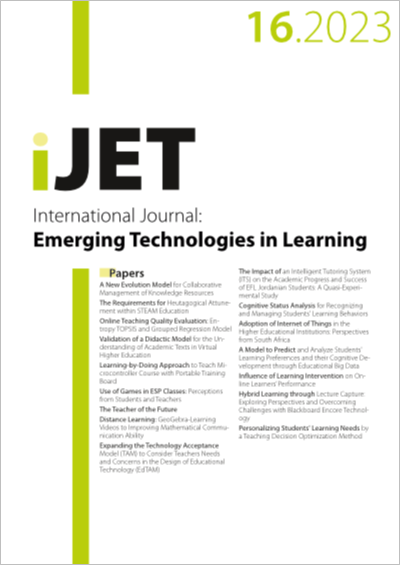Cognitive Status Analysis for Recognizing and Managing Students' Learning Behaviors
DOI:
https://doi.org/10.3991/ijet.v18i16.42705Keywords:
cognitive status analysis, learning behavior recognition, learning behavior managementAbstract
Online learning environments have become increasingly popular due to their flexibility and convenience, but they also present new challenges, such as maintaining student motivation and engagement. To address these challenges, it is crucial to understand and predict students’ learning behaviors. This study explores the recognition and management of students’ learning behaviors through cognitive status analysis. By conducting a thorough analysis of students’ cognitive status and applying advanced deep learning models and algorithms, this study demonstrates the effectiveness of recognizing and managing students’ learning behaviors. The proposed model combines convolutional neural networks and long short-term memory networks with attention mechanisms, which incorporate cognitive status evaluation features and use them as filters for text information. The model’s focus on text sentences with distinctive features in cognitive status evaluation leads to more effective recognition and management of students’ learning behaviors. Additionally, by integrating Most Informative Propositions and Semantic Propositional Value into the deep learning model, this study achieved excellent results in cognitive status evaluation recognition tasks. Further experiments show that by mixing different features and using advanced algorithms, the final model achieves high classification accuracy and F1 scores on multiple types of learning behaviors. Continuous assessment of students’ cognitive status and learning behaviors can lead to the development of effective learning strategies and intervention measures, which can enhance students’ mastery of knowledge and overall performance.
Downloads
Published
How to Cite
Issue
Section
License
Copyright (c) 2023 Nan Zhang (Submitter); Jingyao Zhang

This work is licensed under a Creative Commons Attribution 4.0 International License.



